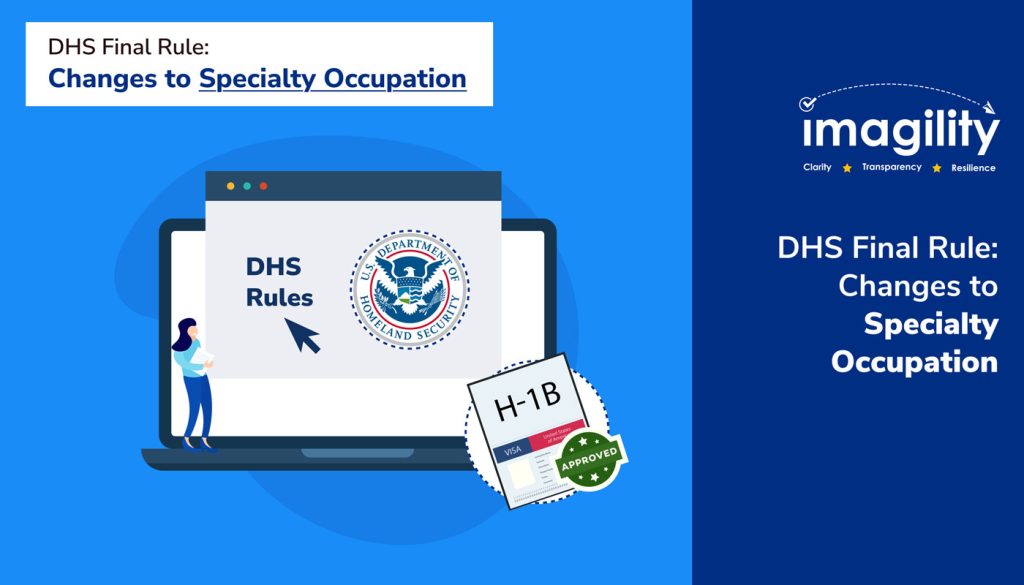The DHS Final Rule (Dec 2024)
On December 18, the Department of Homeland Security (DHS) published a final rule to modernize the H-1B visa program, finalizing changes first proposed in October 2023. The rule will take effect on January 17, 2025, introducing significant updates aimed at clarifying the requirements of the H-1B program and improving program efficiency.
The Department of Homeland Security’s (DHS) new final rule revises and updates the regulatory definition and criteria for determining “specialty occupation” eligibility. It formalizes existing policies regarding deference to prior adjudications and provides clarification on situations that necessitate the submission of a new or amended H-1B petition.
Amended Definition of ‘Specialty Occupation’
The final rule will update the regulatory definition of “specialty occupation” as follows:
[A]n occupation which requires theoretical and practical application of a body of highly specialized knowledge in fields of human endeavor including, but not limited to, architecture, engineering, mathematics, physical sciences, social sciences, medicine and health, education, business specialties, accounting, law, theology, and the arts, and which requires the attainment of a bachelor’s degree or higher in a directly related specific specialty, or its equivalent, as a minimum for entry into the occupation in the United States.
The rule establishes that a position is not a specialty occupation if “attainment of a general degree, without further specialization, is sufficient to qualify for the position.” DHS indicates that the final rule places the burden on the petitioner to demonstrate the required relationship between the degree and the occupation (i.e., that the degree and the occupation are directly related). The final rule provides a definition of the term “directly related,” meaning that there should be a logical connection between the required degree and the duties of the position.
Criteria for Specialty Occupation
The final rule also updates the regulatory criteria used to demonstrate that a position qualifies as a specialty occupation. Specifically, petitions must now demonstrate at least one of the following criteria:
(1) A U.S. baccalaureate or higher degree in a directly related specific specialty, or its equivalent, is normally the minimum requirement for entry into the particular occupation;
(2) A U.S. baccalaureate or higher degree in a directly related specific specialty, or its equivalent, is normally required to perform job duties in parallel positions among similar organizations in the employer’s industry in the United States;
(3) The employer, or third party if the beneficiary will be staffed to that third party, normally requires a U.S. baccalaureate or higher degree in a directly related specific specialty, or its equivalent, to perform the job duties of the position; or
(4) The specific duties of the proffered position are so specialized, complex, or unique that the knowledge required to perform them is normally associated with the attainment of a U.S. baccalaureate or higher degree in a directly related specific specialty, or its equivalent.
New Criteria for Specialty Occupation Explained
- Minimum Degree Requirement: A baccalaureate or higher degree or its equivalent is typically the minimum requirement for entry into the specific position. This criterion emphasizes that the degree must be in a directly related fieldto the job duties being performed
- Industry Standards: The degree requirement must be common in the industry for similar positions among comparable organizations. Alternatively, if a position is particularly complex or unique, the employer can demonstrate that only an individual with a degree can perform it effectively.
- Employer’s Hiring Practices: The employer must normally require a degree or its equivalent for the position. This includes providing evidence of past hiring practices where similar positions required specific degrees
- Complexity of Duties: The specific duties associated with the position must be so specialized and complex that the knowledge required to perform them is usually associated with the attainment of a baccalaureate or higher degree in a specific specialty.
- Evidence of Specialized Knowledge: It is not sufficient for a position to merely require a bachelor’s degree; it must also necessitate specialized knowledge that can only be acquired through education in a specific field. This means that the role should involve tasks that require advanced skills and knowledge directly related to the degree
Implications for Specialty Occupation Classification
- A position cannot be classified as a specialty occupation if it can be filled by someone with a general degree. This change emphasizes that specific, specialized degrees are necessary for qualifying positions, ensuring that only those roles requiring significant expertise are eligible for H-1B sponsorship.
- The rule includes an explicit statement that “normally” does not mean “always,” indicating that while certain degree requirements are typical, they are not absolute. This flexibility allows for a broader range of degrees to be considered acceptable if they logically relate to the job duties.
Conclusion
These criteria aim to ensure that H-1B positions are genuinely specialized and require specific educational qualifications, thereby enhancing program integrity and aligning with labor market needs. Employers seeking H-1B sponsorship must provide comprehensive documentation to support their claims regarding specialty occupations, including job descriptions, industry standards, and hiring practices.
Imagility specializes in building H-1B visas through an AI-enabled automated process, optimizing its success rate. Find out more on www.Imagility.co.
Contact Us for more information
sales@imagility.co
617-865-8444
Related Resources
https://imagility.co/blog/h-1b-program-modernization-a-summary-of-the-dhs-final-rule/
https://imagility.co/blog/how-can-companies-be-compliance-ready/
https://imagility.co/blog/i-9-immigration-compliance-likely-to-be-tightened-under-the-new-trump-administration/
https://imagility.co/blog/foreseeable-changes-to-the-h-1b-visa-implications-for-tech-companies-and-immigrant-workers/









